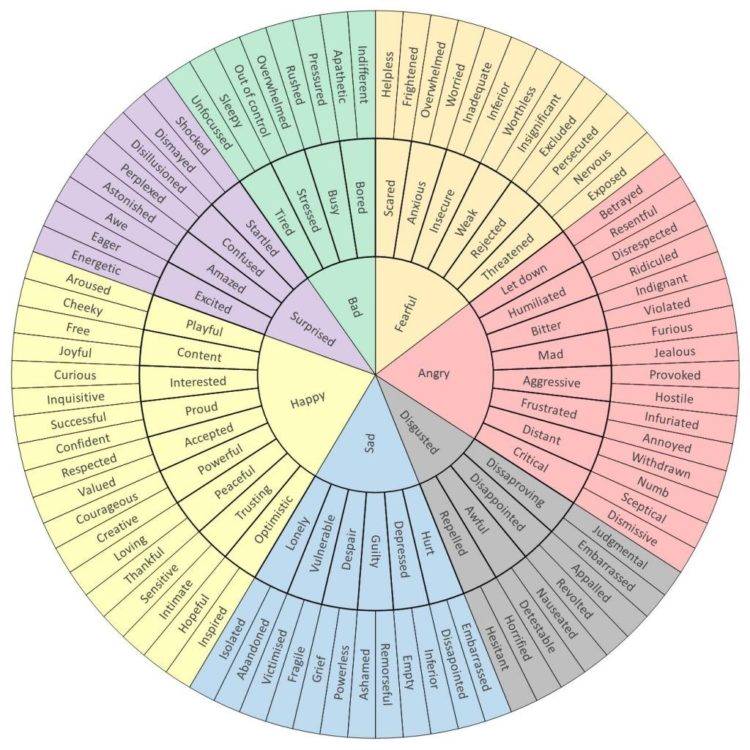
How are you feeling?
How are you feeling right now?
I’m feeling glad that in Victoria, we are at triple 0 (0 new COVID-19 cases, 0 COVID deaths, 0 active cases). But I’m also feeling anxious for those around the world, especially for my families, who are experiencing record cases in their region. I feel elated that I can walk without my mask on. But I feel anxious about my packed schedule for this week. I feel regret that I was not more empathetic for Joshua this morning when he cried that his socks didn’t fit. I feel proud that Micah went to help him.
In 1980, Psychologist Dr. Robert Plutchik created a “Wheel of Emotions” to help people identify their feelings, because if left unchecked, emotions can intensify. He proposed that there were eight primary emotions that serve as the foundation for all others: joy, sadness, acceptance, disgust, fear, anger, surprise, and anticipation.
We tend to dismiss or edit feelings and thoughts we associate as “negative” (sadness, fear, anger, etc.)
But the secret to happiness lies in identifying and experiencing all our emotions.
A study published in the Journal of Experimental Psychology in 2017 (“The Secret to Happiness: Feeling Good or Feeling Right?” Maya Tamir, PhD, The Hebrew University of Jerusalem) surveyed 2,324 university students in eight countries about the emotions they desired and the emotions they actually felt in their lives. The results showed participants who experienced more of the emotions that they desired reported greater life satisfaction and fewer depressive symptoms, regardless of whether those desired emotions were pleasant or unpleasant.
“Happiness is more than simply feeling pleasure and avoiding pain. Happiness is about having experiences that are meaningful and valuable, including emotions that you think are the right ones to have… People want to feel very good all the time in Western cultures… Even if they feel good most of the time, they may still think that they should feel even better, which might make them less happy overall.” Maya Tamir, PhD.
We were created to feel and express a gamut of emotions.
One of the reasons I love the Bible so much and believe that it’s authentic and inspired is because of the range of raw emotions that it portrays.
When Job loses everything (his children, health, wealth, status and friends) the Bible does not hide all the thoughts and feelings of this indignant man:
“Therefore I will not keep silent;
I will speak out in the anguish of my spirit,
I will complain in the bitterness of my soul.
12 Am I the sea, or the monster of the deep,
that you put me under guard?
.. 16 I despise my life; I would not live forever.
Let me alone; my days have no meaning.
Job 30:20-22
What an honest, angry lament! He is not alone; David, in the Psalms, and Jeremiah in Lamentations, and Jesus in the Gospels all express their disappointment, frustration, and grief. They do not shy away from telling God exactly how they feel, and the countless Bible stories reveal that God does not discourage this. In fact, He commends those who wrestle with Him and rewards those who push back (ex: Abraham, Jacob, Moses, Peter). Because God is not interested in blind devotion; He desires a personal, intimate relationship.
So how are you feeling today?
Tell God what’s on your heart. Identify the feelings and thoughts. Share your joys and your fears. And may you then experience what others have:
“I remember my affliction and my wandering,
the bitterness and the gall.
20 I well remember them,
and my soul is downcast within me.
21 Yet this I call to mind
and therefore I have hope:22 Because of the Lord’s great love we are not consumed,
for his compassions never fail.
23 They are new every morning;
great is your faithfulness.
In our honest lament, we find renewed hope in a God who cares.

